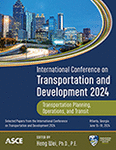Impact of Free Flow Speed Estimation Method on Project Prioritization
Publication: International Conference on Transportation and Development 2024
ABSTRACT
Transportation project prioritization relies heavily on assessments of performance and outcome; however, inconsistencies in analytical techniques of performance measures can significantly skew the results. This study conducts a comprehensive examination of free-flow speed (FFS) estimation methods and the impact of delay threshold selection, demonstrating their pivotal roles in result interpretation and project prioritization. A comparative analysis of several FFS estimation methodologies reveals that methods based on the 85th percentile of observed speeds yield highly correlated FFS estimates, while the 95th percentile methods or simple arithmetic operations of posted speed limits produce divergent results. Moreover, the study underscores the substantial influence of congestion threshold selection on the calculated delay, exhibiting significant variation at statewide, district, and corridor levels. These thresholds not only affect the magnitude of calculated delays but also alter the perceived severity of congestion. The research results underscore the vital need for transportation agencies to adopt standardized methodologies for FFS estimation and congestion delay threshold selection in order to enable consistent, unbiased project evaluation and data-driven prioritization.
Get full access to this chapter
View all available purchase options and get full access to this chapter.
REFERENCES
Abdurrahman, U., Puan, O. C., and Ibrahim, M. N. I. (2014). “Comparison of Free-Flow Speed Estimation Models.” In National Seminar on Civil Engineering Research (SEPKA), Malaysia., At UTM, Malaysia (Vol. 1, p. 69).
California DOT. (2023). Mobility Performance Report. https://dot.ca.gov/programs/traffic-operations/mpr/quarterly. (Dec. 15, 2023).
Dowling, R., Ryus, P., Schroeder, B., Kyte, M., Creasey, T., Rouphail, N., Hajbabaie, A., and Rhoades, D. (2016). Planning and preliminary engineering applications guide to the highway capacity manual. National Academies of Sciences, Engineering, and Medicine.
FHWA. (2020). Urban Congestion Report. U.S. Department of Transportation. https://ops.fhwa.dot.gov/perf_measurement/ucr/documentation.htm. (Dec. 15, 2023).
Florida DOT. (2023). Multimodal Quality/Level of Service Handbook. https://www.fdot.gov/planning/systems/systems-management/systems-management-documents (Dec. 15, 2023).
Hou, T., Mahmassani, H. S., Alfelor, R. M., Kim, J., and Saberi, M. (2013). Calibration of traffic flow models under adverse weather and application in mesoscopic network simulation. Transport. Res. Rec., 2391(1), 92–104.
Jha, K. (2017). Determing Reference Speed from Probe-based Travel Speed Data. Master Thesis, Texas A&M University.
Leong, L. V., and Muhammad, H. (2019). Impact of measurement methods on the development of freeflow speed estimation model for basic segment expressways in Malaysia. Int. J. Adv. Res. Eng. & Tech., 10, 4–13. https://doi.org/10.34218/IJARET.10.4.2019.013.
Minnesota DOT. (2022). 2021 Congestion Report. https://www.dot.state.mn.us/rtmc/reports/ Congestion/CongestionReport2021.pdf (Dec. 15, 2023).
Peer, S., Koopmans, C., and Verhoef, E. (2012). Prediction of Travel Time Variability for Cost-Benefit Analysis. Transp. Res. Part A: Policy and Practice, 46, 79–90.
RITIS. NPMRDS Analytics Suite. https://npmrds.ritis.org/analytics/ (Dec. 15, 2023).
Schrank, D., Albert, L., Eisele, B., and Lomax, T. Urban Mobility Report. Texas A&M Transportation Institute. https://mobility.tamu.edu/umr/ (Dec. 15, 2023).
TRB (Transportation Research Board). (2022). Highway Capacity Manual 7th edition. Transportation Research Board of the National Academy of Science, Engineering, and Medicine.
TTI (Texas A&M Transportation Institute). Texas’ Most Congested Roadways. https://mobility.tamu.edu/texas-most-congested-roadways/ (Dec. 15, 2023).
Virginia DOT. (2021). Operations Performance. https://www.virginiadot.org/business/resources/OperationsDivision/2021_Traffic_Operations_Performance_Report_ACC041922.pdf. (July 20, 2023).
Virginia DOT. (2023). SMART SCALE. https://www.smartscale.org/ (Dec. 15, 2023).
Williges, C., and Mahdavi M. (2008). Transportation Benefit-Cost Analysis. Transp. Res. Rec., 2079, 79–87.
Washington DOT. (2018). Corridor Capacity Report. https://wsdot.wa.gov/publications/fulltext/ graynotebook/corridor-capacity-report-18.pdf. (Dec. 15, 2023).
Wolniak, M., and Mahapatra S. (2014). Data- and Performance-Based Congestion Management Approach for Maryland Highways. Transp. Res. Rec., 2420, 23–32.
Xu, J., and Lambert J. (2015). Risk-Cost-Benefit Analysis for Transportation Corridors with Interval Uncertainties of Heterogeneous Data. Risk Analysis, 35, 624–641.
Information & Authors
Information
Published In
History
Published online: Jun 13, 2024
Authors
Metrics & Citations
Metrics
Citations
Download citation
If you have the appropriate software installed, you can download article citation data to the citation manager of your choice. Simply select your manager software from the list below and click Download.
